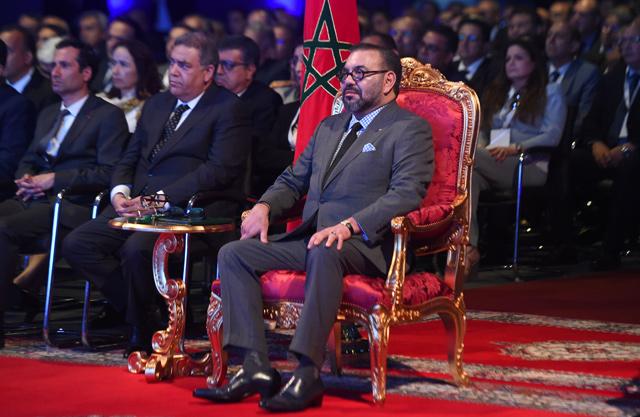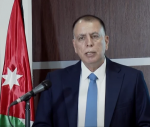You are here
Morocco king marks two stable decades despite economic woes
By AFP - Jul 28,2019 - Last updated at Jul 28,2019

In this file photo taken on June 20 Moroccan King Mohammed VI attends the inauguration of a car assembly line at the Kenitra PSA Car Assembly Plant (AFP photo)
RABAT — King Mohammed VI is preparing to mark 20 years on the throne of Morocco, a North African country seen as a regional island of stability.
The kingdom's towns and cities have been decked out with flags to mark the anniversary on Tuesday, while newspapers have published editorials praising the monarch's achievements.
But recent weeks have also seen a wave of criticism over the “Moroccan decline”, with commentators citing economic stagnation and its crippling effects on the young.
When he took the throne in 1999 following the death of his father Hassan II, the then-35-year-old inspired great expectations, earning the nickname “king of the poor”".
In his first speech as king he listed the ills facing the country: poverty, unemployment and social inequality.
Twenty years later, those same ills haunt the kingdom, where news magazine Maroc Hebdo recently ran the headline “It's better not to be Moroccan in 2019”.
The article slammed “the persistence of unemployment..., the slow pace of structural change and the deepening of inequalities”, along with the dearth of opportunities for the young who make up a third of the 35 million population.
Royal adviser Omar Azziman, in a rare interview with AFP, admitted that there was “dissatisfaction” in the country.
“We can't find jobs for our young people, we have regions that are too poor,” he said.
As the Arab Spring swept across North Africa and beyond, Mohammed VI nipped swelling protests in the bud by offering up constitutional reforms and promising to curb his powers.
The country's long-marginalised Rif region was rocked by months of protests from late 2016, sparked by the death of a fisherman and spiralling into a movement demanding more development and railing against corruption and unemployment.
Several hundred protesters are thought to have been arrested and tried in connection with the demonstrations, but no official figures are available.
‘Enormous changes’
While the king has pardoned around 250 of them, rights groups saw authorities' response to the Hirak protest movement as a step backwards.
Amnesty International regularly denounces “arbitrary” arrests and detentions in Morocco and raises doubts over the fairness of its judicial system.
“There hasn't really been any democratisation, more a form of liberalisation,” said prominent academic and rights activist Maati Monjib.
“We saw a period of opening up, but it corresponded to a dynastic transition aimed at maintaining an executive monarchy.”
But according to Abdellatif Menouni, a constitutional scholar and royal adviser since 2011, under Mohammed VI “most of [what is needed] in terms of democracy has been done, it just needs to be deepened”.
For analyst Mohamed Tozi, Morocco's stability in a tumultuous region is a key performance indicator given the regional context.
He cited a 2004 family law boosting women's rights, commissions set up to probe abuses under Hassan II and the existence of political parties as “enormous changes”.
But despite that, seven out of ten young Moroccans, seeing few prospects, say they want to emigrate, according to the Arab Barometer survey.
The International Monetary Fund has urged the kingdom to move towards a “more inclusive” model of development and tackle inequality, saying it had been slow to push through reforms.
Mohammed VI, who retains control over the country's most strategic sectors, has overseen an economic strategy focused on attracting foreign investment, from roads and airports to the vast Tanger Med port.
Related Articles
RABAT — Morocco's King Mohammed VI on Sunday urged the government to take "urgent action" to address social issues, in particular health and
AMMAN — His Majesty King Abdullah on Thursday sent a cable to King Mohammed VI congratulating him on the anniversary of his accession to the
AMMAN — His Majesty King Abdullah on Thursday took to Twitter to express pride in Morocco national team's achievement at the FIFA World Cup















